

Citing sources. Creative Literature Projects Students Love. Sometimes it’s difficult to get students interested in literature, especially the classics.

Spicing up lesson plans with some creative projects allows students who are not traditionally academically successful to show what they’ve learned in a slightly different way. The results can be refreshing and rewarding! Here are ways you can spice up your lessons as well have examples of what I have done in my classroom. Creating Themed Environments in Your Classroom Creating a classroom party around a themed book topic can be fun and educational. 3 Cornerstones for Teaching and Assessing Writing: My Philosophy — TeachWriting.org. Building Book Love : 5 Essay Grading Tips for Grading Essays Faster and More Efficiently: Save time grading essays online or in print. Dragging 75 essays home to grade over the weekend should not be a badge of honor.

It doesn’t prove that you are a good teacher, and there's evidence that it won’t give your students an adequate return on your time investment. Whether you are grading essays online or in print, I believe the educational magic happens in the classroom—not in your lonely living room on a sunny Sunday afternoon. Studies show that students need fast, focused, and frequent feedback, so if you can figure out how to provide effective feedback faster, then all will benefit. The power of digital storytelling. Building Book Love : 5 Essay Grading Tips for Grading Essays Faster and More Efficiently: Save time grading essays online or in print. Simplicity or style: what makes a sentence a masterpiece? A great sentence makes you want to chew it over slowly in your mouth the first time you read it.

A great sentence compels you to rehearse it again in your mind’s ear, and then again later on. A sentence must have a certain distinction of style – the words come in an order that couldn’t have been assembled by any other writer. Here’s an elaborate, Latinate favourite, from Samuel Johnson’s preface to his Dictionary of the English Language (1755). We have to train ourselves to read complex sentences like this one, but if it’s read properly out loud by an actor or someone else who understands the way the subordination of clauses works, it may well be taken in more easily through the ear: The sentence is elevated in its diction, but it is also motivated by an ironic sense of the vanity of human wishes.
Edward Gibbon is one of 18th century Britain’s other great prose stylists. The first sentence of any novel works as an invitation into a new world. Hasn’t the sentence become dated? Critical Friends: Collaborating as Writers. WriQ a new Google Add-On to assess the numerical quality of writing. QOEGVGRADINGRUBRIC(3) 6 Reasons to Try a Single-Point Rubric. As educators, we know the power of a good rubric. Well-crafted rubrics facilitate clear and meaningful communication with our students and help keep us accountable and consistent in our grading. They’re important and meaningful classroom tools. Usually when we talk about rubrics, we’re referring to either a holistic or an analytic rubric, even if we aren’t entirely familiar with those terms.
A holistic rubric breaks an assignment down into general levels at which a student can perform, assigning an overall grade for each level. Toolbox from On Writing by Stephen King. Explode These Feedback Myths and Get Your Life Back. When asked what recommendations they would give teachers to improve feedback…students claimed to want more, and more useful, responses to their writing.

A wide majority — 87% — rated as “important” or “very important” the advice that teachers give more detailed feedback on papers. — Harvard Study of Undergraduate Writing That’ll do, Harvard Study of Undergraduate Writing, that’ll do. I don’t know what you saw in that quote, but all I saw were the words more, more, and more. And while I would love to provide students — Harvard undergraduates included — the feedback they crave, what I don’t love is the towering pile of papers, the endless succession of assignments waiting to be assessed.
In years past, that reality manifested as an actual pile, one that sat on my lap for hours or glowered at me from a nearby shelf. Too often, the task of providing feedback on papers and other assessments has pushed me to the breaking point as an English teacher. But what about the kids? Rubrics – Kaizena. Rethinking Revision: The Real Work of Writing. By Ruth Culham Children don’t hate to write; they hate how we teach writing. Some of the most deeply embedded methods of teaching writing – worksheets, canned prompts, and formulas, for example – drain all of the energy and desire required to write well. Our classrooms should be places of inquiry, joy, trial and error, exploration, success and failure, and fascinations revealed—where the process of discovery matters as much as (if not more than) the destination.
An essential part of the learning process. Years ago, I would have shuddered at the thought of asking my students to redo an assignment, envisioning myself chained to my desk for hours, buried under paper.
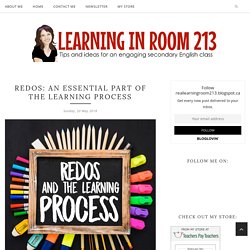
However, several things made me change my mind about this: 1. Grading Policies for Middle & High School: Making It Meaningful & Increasing Student Accountability. September 23, 2016 This #2ndaryELA Twitter chat was all about grading policies in the ELA classroom.
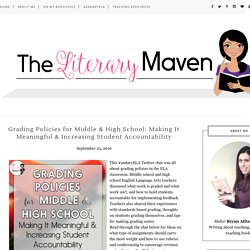
Middle school and high school English Language Arts teachers discussed what work is graded and what work isn't, and how to hold students accountable for implementing feedback. Teachers also shared their experiences with standards based grading, thoughts on students grading themselves, and tips for making grading easier. The Daring English Teacher: Collaborative Essay Brainstorming Strategies for Secondary Students. Begin your next essay with some collaborative essay brainstorming strategies that will get your students engaged, motivated, and ready to write.
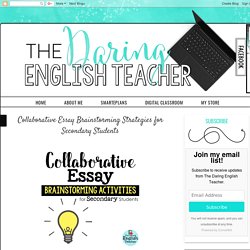
Brainstorming is an important part of the writing process. Before I assign a formal essay to my students, I like to take them through some collaborative brainstorming strategies to help prepare them for the task. At First Glance: A Sentence Starter Adds Unexpected Rigor to Writing. We wrapped up two days of workshops on Ratio on Friday.
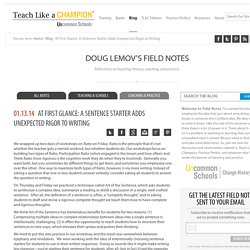
Ratio is the principle that it’s not whether the teacher gets a mental workout, but whether students do. Our workshops focus on building two types of Ratio, Participation Ratio (who’s engaged in the lesson and how often) and Think Ratio (how rigorous is the cognitive work they do when they’re involved). Generally you want both, but you sometimes do different things to get them, and sometimes you emphasize one over the other. One way to maximize both types of Ratio, however, is via more writing. 10 Tools & Resources for Developing Writing Skills. Over the last couple of months I've found and written about a number of really great tools and resources to help improve our students' writing skills.
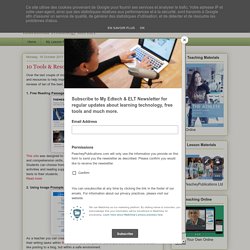
This is a collection of links to reviews of ten of the best. 1. Free Reading Passages and Progress Tracking Tools. Improve Writing Skills with Peer Evaluation. Getting students to peer evaluate can be a real organisational challenge in the classroom, but now it looks like there is a simple technological solution.

Peergrade is a great tool to get students assessing each others’ work and giving each other feedback. You can create classes and then assign digital assignments that can include a range of different media. These assignments are then sent to students. The students then complete and submit their tasks online. Once they have submitted their assignment they then grade the assignments of their peers. After they have graded their peers they are able to find the feedback from their peers on their own work.
Misconceptions about Teaching Grammar. Feedback_Rubrics. Edutopia. Writing teachers know that students need to write a lot and get meaningful feedback in order to improve their writing. We also know what it feels like to be buried under a pile of student writing that needs to be read and commented on, and although there are many strategies that can help us deal with this paper load, it’s still a daunting part of our work with students. When I initially considered conferencing with each and every student in my classes to reduce the need for written comments, I was apprehensive about the time commitment, but with the help of a colleague who had made it work in his classroom, I recently took the plunge and did writing conferences with my students—and it had a huge impact on my classroom and my students’ learning.
Writing a Letter of Recommendation for Students. The Daring English Teacher: Writing a Class Collaborative Précis. I recently started teaching rhetorical analysis to my sophomores. This unit precedes our research paper, and so one of the goals of my rhetorical analysis unit is to help students become critical readers. I want my students to be able to read a complex text and know a few things within their first read: I want them to know if it is a credible source, I want them to know the author’s purpose, and I want them to begin thinking about why the text is effective. Try my Argument Research Paper Outline Subscribe to receive my research paper outline via Google Docs. Thank you for subscribing! When I teach rhetorical analysis, I also teach the rhetorical précis.
Or How to Add More Detail to Your Writing. A Collaborative Approach to Improve Writing. AP Literature students are challenged to read a fresh passage, determine the task, formulate an insightful argument, and write a thoughtful, coherent first-draft essay in 40 minutes. This is a daunting proposition for all students, but for those students who struggle with time pressures, AP timed-writing can be overwhelming. One way to help all students develop the requisite skills to be successful on the AP exam is the group timed-writing. My students recently wrote a group timed writing based on Oscar Wilde’s play Lady Windermere’s Fan, and as you can see, they were pretty excited about the process!
The Plan I place students in groups of 3-4. Finalsample-quality_feedback. Use Narrative Writing for Understanding Literature - Room 213. The Writer's Workshop. Professional Development by Smekens Education - Category: "6 Traits of Writing" What Works? The Power of Formative Feedback in a Blended Classroom - NCTE. This post is by member Macy Geiger. Ebook.pdf. Writing Resources – Matthew M. Johnson. Good writers are made, not born (essay) The author-god, according to mid-20th-century language theorist Roland Barthes, embodies the Romantic notion of the artist to whom brilliant epiphanies come to be written down. In fact, at times throughout history, the best authors were believed to have been chosen and directly inspired by God himself.
Because of this cultural paradigm, many of us are deeply psychologically invested in the idea of individual genius authorship, and it manifests negatively in students’ approaches to their classes and other rhetorical situations that require critical reading and writing skills. 501writingprompts. Mood and Tone - Google Slides. Teach Essay Writing Skills Without Grading Any Papers - Room 213. Collaborative Essay Brainstorming Strategies for Secondary Students.
Begin your next essay with some collaborative essay brainstorming strategies that will get your students engaged, motivated, and ready to write. Brainstorming is an important part of the writing process. February - Mrs. Erskine's English site (with Mrs. Paradiso) No Dead Fish: Teaching Students to Write Effective Introductions. Dead Fish Handshakes are a huge pet peeve of mine. You offer your hand in greeting and the other person returns a grip that is downright soggy, their hand flopping in yours like a lifeless cod. It’s not a huge offense in the grand scheme of things, but it also seems like such an easy thing to avoid. Just get a grip, people. Of course, pedestrian, soulless introductory paragraphs are much more difficult to avoid. FREE Comprehensive Essay Checklist by The Daring English Teacher. Grammar for High School. 3 Fun Strategies for Note Taking. Getting Started with Student Created Assessments in ELA - David Rickert.
#2ndaryELA Chat Summary: Writing Research Papers. This #2ndaryELA Twitter chat was all about writing research papers in the secondary ELA classroom. Middle and High School English Language Arts teachers discussed the types and frequency of research papers written, choosing topics, finding reliable sources, creating an outline, citing sources and paraphrasing versus plagiarism.
Why I Don't Grade. MLA Format and Citation (8th Edition) PowerPoint Presentation. 3 Steps to Engage Students in Research Writing. Commonplace Books Then and Now. Download. Curriculum Pathways® 20 Types Of Learning Journals That Help Students Think. The Great and Powerful Graphic Organizer. Diminishing the Disconnect: Student Perspective on Relevant Writing Feedback. ABCStrategyforPrompts. 5 Ways to Get Students to Use Your Feedback - Room 213. Writers Workshop Poster: How to Write a Good Essay Poster - WeAreTeachers. Argument Essay Writing BUNDLE Editable Google Drive by Tracee Orman. 5 Ways to Focus on Pre-Writing - Room 213. Alternatives to the 5 Paragraph Essay. NCTE/CLAS 2017 Stop Grading, Start Reflecting - Google Slides. EJ1065Principled. Teaching Vocabulary in High School. Increasing Vocabulary Retention in the Secondary ELA Classroom. The Perfect Tool for Review & Differentiation - Room 213. How to Deal with Student Grammar Errors.
Organizing to Communicate: Open the Door of Your Writing Workshop to School Families. Is It Time To Go Back To Basics With Writing Instruction? Origin and history of Conference by Online Etymology Dictionary. English Language Roots - Prefixes, Suffixes & Syllables - PrefixSuffix.com. Is It Time To Go Back To Basics With Writing Instruction? Argument Writing Feedback. How to Deal with Student Grammar Errors. Functional Grammar Table – Literacy For Pleasure. Functionalgrammartable final version. OWL Home - Excelsior College OWL. Home — TeachWriting.org. Writing Lessons & Resources for Writing Teachers. Looking at, and Learning from, Student Writing – Achieve the Core Aligned Materials. Sharing Our Notebooks: Melissa Stewart: My Most Critical Writing Tool.
How to Write Fiction. Peer Feedback Form - Writer's Workshop by Nouvelle ELA. Writer's Workshop: Short Stories in High School - Nouvelle ELA Teaching Resources. How To Grade Writing as an English Teacher. Is It Time To Go Back To Basics With Writing Instruction? Best of the Best Essay Writing Instruction. More Than a Grade: Cultivating Intellectual Play in Students. Persuasive peer evaluation form.docx. Peer Revision 101 - Google Slides. Free Writing Lessons Download. Top 10 Websites for Teaching with Primary Sources in the Secondary Classroom. Four Ways to Formatively Assess in Workshop.
Strategy For Deeper Student Conversations: Conver-Stations. Essay Grading Time Saver. What, how, why: Finding your voice as an educational storyteller.